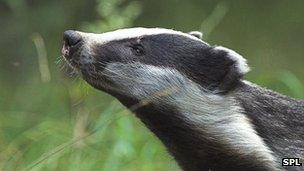Analysis: The battle over brock
- Published

The badger: A reprieve for now?
The government has postponed the badger cull in England this year, saying farmers have run out of time to complete the shooting before the animals go underground for the winter.
The Environment Secretary Owen Paterson says he remains committed to the policy. However, campaigners have welcomed the delay and want the cull to be abandoned completely.
So what happens next?
A pause for thought?
Farming leaders say a series of obstacles, including the weather and legal challenges, made postponement the responsible option this year.
NFU President Peter Kendall said: "Postponement is the most responsible thing to do. We have said all along that this has never been about killing badgers; this has always been about eradicating disease. It has been about the battle to get on top of the TB on our farms that strikes at the very heart of our beef and dairy herds."
The cull cannot now happen until June next year at the earliest, because of the lifestyle of the badger - a protected species in Britain. Campaigners say this gives pause for thought over the policy.
Gwendolen Morgan, of Bindmans LLP, acting for the Badger Trust, said: "In light of the way matters have now developed, and the lessons learnt over the past few weeks, we look forward to the government conducting a transparent review of all the issues including the cost-benefit ratio, the science, risks to public safety of free-shooting in the dark, animal welfare and the emergence of more effective alternatives to culling."
MPs will go ahead with a debate on the culling of badgers on Thursday.
Is vaccination the answer?
Opponents to the cull are arguing for a push towards research into vaccinating cattle and badgers.
Martin Harper, conservation director of the RSPB, said: "This window gives Owen Paterson an opportunity to lead the government out of this muddle by embracing a vaccination programme, giving a lifeline to livestock farmers and badgers."
Badgers are being vaccinated in England, mainly by wildlife charities, while Wales has chosen vaccination over culling. But there is disagreement over the practicalities of vaccinating large numbers of badgers year after year.
Ministers say cattle vaccination is not currently an option due to EU regulations. The main problem is that a test developed by UK scientists to distinguish between vaccinated and infected cows has not been approved.
Environment Secretary Owen Paterson told the Commons on Tuesday: "If we had a viable and legal cattle vaccine, we would be using it. It will, however, be some years before this is the case and neither we nor the industry can afford to wait that long. It is for this reason that we must look at all the options."
You can read the full text of the statement here, external.
Lessons from New Zealand?
BBC News has learned that a cattle TB vaccination programme started in New Zealand in 2004.
Cattle can be vaccinated and their products consumed locally using a test that can tell between TB infection and vaccination, although the products cannot be exported to either the EU or the US, according to officials.
Paul Livingstone, manager of TB eradication and research at the Animal Health Board in New Zealand, told BBC News: "BCG-vaccinated cattle are consumed on the local New Zealand market, we don't export their carcases to the USA."
Cattle vaccination has been tested on research sites, where cattle are grazed in areas where possums, which carry TB, are present.
"You're saving about 65% of cattle from becoming infected," said Dr Livingstone. "But it's not 100%."
A cattle vaccine and Diva (Differentiate Infected from Vaccinated Animals) test developed by UK scientists has been submitted to regulators.
However, according to the Department for Environment, Food and Rural Affairs (Defra), the approval process could take years.
Field trials on cattle TB vaccines are banned in the UK, but scientists have been collaborating with countries where vaccination programmes are ongoing, including the US, Argentina, Ethiopia, Mexico and New Zealand.
They include small field trials carried out in Ethiopia over two years, which showed that TB vaccination protected 56% of cattle from infection. A study in Mexico gave similar results.
Prof Glyn Hewinson of the Animal Health and Veterinary Laboratories Agency said: "Although these are small-scale trials, they are indicative of the sort of protection one might expect, but larger-scale trials will be required to give us greater certainty around the effects of vaccination."
Questions over cost
According to the government's own bovine-tb-impact-assessment, external, the public costs of carrying out the cull exceed any money saved from predicted falls in bovine TB (an average 16% reduction in new cases over nine years - in absolute figures, this amounts to preventing 47 out of 292 infected herds, for an area about half the size of the Gloucestershire pilot zone).
Precise surveys of badger numbers in the pilot zones in Gloucestershire and Somerset revealed about twice as many badgers as expected. The surveys cost £850,000. Other costs to the public purse include monitoring, licensing and training marksmen.
The government says it will compensate police forces for work done in the run up to the cull, but precise figures have not been revealed.
- Published23 October 2012
- Published16 October 2012
- Published23 October 2012